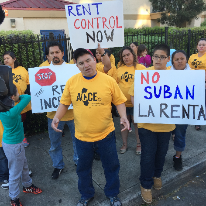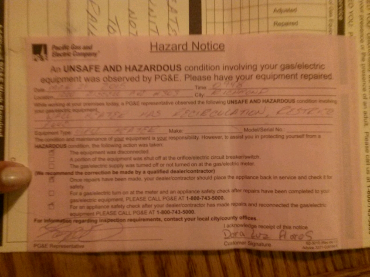Yesterday, ACCE responded to my E-FORUM Fight Over Rent Control Heats Up in Richmond, March 31, 2015, and David Sharples of ACCE asked me to publish it, which I will gladly do, but not without comment. The ACCE response follows my comments below.
ACCE and I agree on a fundamental belief that the inequality gap in America is harming us all and that lifting people out of poverty in Richmond and the Bay Area is an objective that will make all of our lives better. No one writes about this more than Robert Reich, who regularly describes the crisis and tell us how to move out of it, as in 10 Ways to Close the Inequality Gap. Also see Poverty Rates Near Record Levels in Bay Area Despite Hot Economy.
After the fundamentals, ACCE and I pretty much part company. Like the 1980s country song by Johnny Lee “Lookin’ for Love in All the Wrong Places,” ACCE is looking for solutions in all the wrong places. One of those places is rent control, with which ACCE is utterly obsessed. Instead of looking at the root causes of poverty and some low hanging fruit for addressing it, they want to tear down one person to build up another. They are more into class warfare than solutions, but the battles they pick are mere skirmishes and guerilla warfare that target symptoms rather than causes.
In the ACCE response, presumably written by Sharples, they continue to tear down Guadalupe Campos, a Mexican immigrant who worked hard, saved his money, played by the rules and eventually became the manifestation of all evil – a landlord! ACCE picketed his home and is now fomenting a rent strike. To personalize their war on Mr. Campos, they invoked one of his tenants, Hector Monico, who reportedly makes $12.75 an hour at Foods Co across the street.
I can stipulate that Mr. Monico has a problem. At $1,150 a month (his new rent), he is paying 52% of his income for housing when 30% is the generally accepted maximum. The 2014 Federal Poverty Level for a family of four is $23,850, which means Mr. Monico is living just above the poverty level – as defined by the government – but much below what he and his family really need. According to a recent Contra Costa County report, Ensuring Opportunity – Addressing Poverty in Contra Costa County, 18,454 Richmond residents are doing even worse than Mr. Monico and actually living below the government defined poverty level.
ACCE supported Richmond’s minimum wage ordinance passed last year, but Monico’s income is 33% above that, so that isn’t any help to him. ACCE member Marvin Willis said at the time the ordinance was passed, “ he’s happy with the increase to $12.30 for now.”
Below, Richmond Minimum Wage Table
So ACCE decided the best way to help Mr. Monico was to go after his landlord. But instead of shaking down Guadalupe Campos, it is puzzling why ACCE did not instead go after Mr. Monico’s employer, Foods Co and insist on a higher wage. Foods Co is a subsidiary of The Kroger Company the country's largest supermarket chain, second-largest general retailer (behind Walmart), and twenty-third largest company. Kroger is also the fifth largest retailer in the world. As of February 2013, Kroger operates, either directly or through its subsidiaries, 2,625 stores. If you are looking for a deep pocked evil giant, Kroger would fit the description better than Campos.
Surely Kroger could afford to pay Mr. Monico more. Kroger’s board chairman David B. Dillon took home $12,753,319 in 2013, and its CEO W. Rodney McMullen took home $8,822,303. In 2014, Kroger raked in $108,465,000, over a billion dollars.
After trashing Guadalupe Campos for being a landlord as if it were a felony, Sharples moved on to alleged defects in the apartments. Mixing rent levels and maintenance obligations is like mixing apples and oranges.
You don’t need rent control or just cause to force a landlord to make repairs. Existing law provides remedies, and there is plenty of free help for tenants (see Home Equity Preservation Alliance (HEPA), comprised of five agencies under the leadership of the Community Housing Development Corp. HEPA brings together the expertise of counseling agencies certified by the federal government (HUD) in Mortgage Delinquency and Default Resolution Counseling with highly skilled legal service providers who work closely with the Contra Costa County District Attorney’s Office.
According to California Tenants, “A rental unit must be fit to live in; that is, it must be habitable. in legal terms, “habitable” means that the rental unit is fit for occupation by human beings and that it substantially complies with state and local building and health codes that materially affect tenants’ health and safety.”
ACCE pointed out a sewage leak and a faulty heater as examples of landlord negligence. The photo of the PG&E hazard notice on a heater was dated March 21, 2015, barely two weeks ago. California Tenants notes that, “The tenant must give the landlord a reasonable period of time to make the needed repairs. What is a reasonable period of time? this depends on the defects and the types of repairs that are needed. the law usually considers 30 days to be reasonable, but a shorter period may be considered reasonable, depending on the situation.”
What we have here is a 30-year old building that is going to have maintenance issues. You cannot expect a building like this to function perfectly all the time, even the plumbing. Shit happens. The question is not whether a pipe broke but whether the landlord cleaned up the mess and made repairs. Apparently he did. Mr. Campos informed me that all of the defective heaters and venting problem have already been repaired.
Even bringing up the garages is interesting. In addition to having larger units and below market rents, these buildings also have secure garages, an unusual feature in affordable housing in Richmond. I saw a few cars there that were even newer and nicer than mine.
Moving on to affordable housing, Sharples says he agrees with me and, “That’s why ACCE members have been advocating that the city increase its ‘in lieu fees’ as part of the city’s inclusionary housing policy.” Again ACCE would cut off its nose to spite its face. Inclusionary housing is a great way to fund affordable housing, but it only works if market rate housing is built. No significant market rate housing has been built in Richmond for over a decade, and the best way to make sure this trend continues is to add additional barriers like increasing the in-lieu fees.
Sharples also says, “ACCE members have also been saying that UC Berkeley needs to invest in an affordable housing trust fund as part of a community benefits agreement related to the Berkeley Global Campus.” What ACCE fails to understand is that UC Berkeley is not Chevron. It is a cash-strapped public agency with limited resources. If UC Berkeley funds housing in Richmond, it has to come from somewhere, and if you are following the news, it would probably have to come from raising student fees. This makes no sense to rob UC students to pay for housing in Richmond. There are a lot of creative ways UC and Richmond can collaborate to address affordable housing, but a cash transfer is probably not going to be one of them.
Finally, Sharples ridicules my successful effort to reduce the amount of Campos’ proposed rent increases. The amount Campos agreed to was worth about $24,000 in a year, but clearly ACCE was not impressed. They want to limit rent increases to 3% per year based on nothing. I already pointed out that the new rents Mr. Campos has noticed are 17% below average market back in December 2014. And this building has much larger than average units and secured basement parking. Not that I agree with any kind of rent control, but if there is going to be rent control, it is much more fair to base it on prevailing rents rather than a percentage of increase
As I began this response, I talked about low hanging fruit. One example is CalFresh. CalFresh is the California version of the federal Supplemental Nutrition Assistance Program (SNAP), formerly and popularly known as food stamps. Contra Costa County estimates that nearly 5,000 people in Richmond are eligible for but not using CalFresh, and if they signed up and used it, they would benefit from over $5 million added to their food budgets (about $1,000 per person per year). Instead of harassing landlords, ACCE should get these 5,000 people signed up and get that money into the local economy.
Another bit of low hanging fruit is the Earned Income Tax Credit that can return up to $6,044 to a family with three qualifying children. Earn It! Keep It! Save It! (EKS) is a coalition of Bay Area organizations that provides free tax preparation to households earning less than $53,000 a year. We know the benefits of free tax preparation and tax refunds on taxpayers and their households. This would be another excellent way to increase the spending power of low-income households in Richmond.
In his article 10 Ways to Close the Inequality Gap Robert Reich does not mention rent control, but he does list education:
Invest in education. This investment should extend from early childhood through world-class primary and secondary schools, affordable public higher education, good technical education and lifelong learning. Education should not be thought of as a private investment; it is a public good that helps both individuals and the economy. Yet for too many Americans, high-quality education is unaffordable and unattainable. Every American should have an equal opportunity to make the most of herself or himself. High-quality education should be freely available to all, starting at the age of 3 and extending through four years of university or technical education.
This is the reason that I, along with Vice-mayor Myrick, negotiated a $35 million fund in the Chevron Community Benefit Agreement to make sure every high school graduate in Richmond has the financial means to attend college
In conclusion, ACCE and I share the same objectives; we just differ on how we approach them. In my opinion, ACCE wants to address symptoms rather than root causes and do it on the backs of landlords and others who are not responsible for the inequities so many face. Rent control does not work, and all you have to do is look at San Francisco, Oakland and Berkeley, all rent control pioneers, to see this. San Francisco has had rent control for decades but has the highest level of poverty and the highest rents of any county in the Bay Area, not to mention a disappearing middle class.
Richmond needs increased economic vitality to create jobs and provided more housing, but the policies ACCE advocates will have the opposite effect. They would destroy Richmond’s economy in the name of mitigating poverty.
Tom Butt
Following is the ACCE response to E-FORUM Fight Over Rent Control Heats Up in Richmond, March 31, 2015
Richmond ACCE Members Respond to Mayor Butt on the Need for Tenant Protections
In his e-forum on Tuesday, Mayor Butt told a compelling but misleading story about Guadalupe Campos’s rise from a poor farm worker in Mexico to a garbage truck driver in San Francisco. He left out one important detail about Guadalupe Campos. He’s also a big landlord. Campos owns eleven buildings in Richmond, San Pablo, Antioch, Clovis, Fresno and Turlock.
Mayor Butt also left out the story of the vulnerable tenants who live at 1300 and 1200 Bissell Ave here in Richmond that are at risk of being pushed out of the city. Hector Monico lives at 1300 Bissell Ave. He is a meat cutter at Foods Co. making $12.75 per hour. Hector is married with a wife and two kids he’s working hard to provide for. Hector and many of his neighbors became ACCE members to have an organized voice. Hector has been hosting tenants meetings at his apartment and was one of the leaders of the action last Friday where ACCE members from 1300 Bissell travelled from Richmond across the bay to Millbrae to tell Campos they could not afford the rent increase. On Wednesday Hector was one of the leaders of a partial rent strike. 30 ACCE members gathered in front of their building on Wednesday to hold a press conference and announce they would not be paying the rent increase. They then delivered their checks to the building manager.

Hector Monico, who lives at 1300 Bissell Ave. spoke during the press conference
Hector is not alone. Gabriela Mercado, another ACCE tenant leader at 1200 Bissell is disabled and is collecting food stamps. She said - "We cannot afford this rent increase because we are already stretching to make ends meet and feed our families." There is a large population of vulnerable tenants who could be pushed out of Richmond if we as a city don’t put in place some reasonable, common sense tenant protections like rent control and just cause eviction protections. According to Haas Institute’s recent report “Belonging and Community Health in Richmond” there are more than 6,700 vulnerable tenants in Richmond who earn less than $35,000 per year and spend more than 30% of their income on housing.
Mayor Butt also claimed that there were no serious issues with the conditions at 1300 and 1200 Bisssell and that the problems with conditions were mainly “cosmetic.” On Wednesday, on the day of the tenants’ partial rent strike, we saw the tenants’ parking garage in 1200 Bissell Ave. flooded with sewage, with dirty water and feces spilling out of a pipe onto the floor of the garage where many of the tenants park their cars. Then today one of the tenants reported that dirty water had backed up in her sink and flooded her bathroom. Another tenant has a heater which does not vent the carbon monoxide properly. PG&E says the heater is unsafe and hazardous because it is recirculating carbon monoxide. Last year Gabriela Mercado ended up in the hospital because she was having the same problem with her heater not venting the carbon monoxide. Despite this serious problem the carbon monoxide detectors in many of the units don’t work. There is mold on the ceilings of a number of units. There are also problems with carpets that have not been changed for more than ten years. The tenants also say that whenever they complain about conditions in the building it takes months for the building manager to respond. Given the fact that Guadalupe Campos is collecting $40,000 in rent from the tenants at 1300 and 1200 Bissell every month, you would think he would be able to make basic repairs.

Sewage water spewed out of a pipe onto the floor of the parking garage where tenants at 1200 Bissell Ave. park their cars. The water smelled disgusting and there was feces on the floor. Tenants report that this has happened before.

A Hazard Notice issued by PG&E indicating one of the tenants at 1200 Bissell has an unsafe and hazardous wall heater that is recirculating carbon monoxide.

Mold on the ceiling of Roberto Romero’s unit in 1300 Bissell Ave.
In terms of Mayor Butt’s comments on the Richmond Housing Element, ACCE members strongly agree with Mayor Butt’s assertion that we need to increase the supply of affordable housing units in Richmond. That’s why ACCE members have been advocating that the city increase its “in lieu fees” as part of the city’s inclusionary housing policy. ACCE members have also been saying that UC Berkeley needs to invest in an affordable housing trust fund as part of a community benefits agreement related to the Berkeley Global Campus.
In the end Mayor Butt said that as a “good will gesture” he was able to get the owner Guadalupe Campos to limit the increase from 20% to 15%, meaning that most tenants at 1300 and 1200 Bissell would see their rent increase from $1000 to $1150. This is confusing because throughout his article Mayor Butt was saying we don’t need reasonable curbs on the amount that a landlord can raise the rent but then at the end of the article he says he negotiated with the landlord to curb the increase. Should we expect Mayor Butt to swoop in and negotiate with every landlord every time they jack up the rent on a vulnerable tenant? In fact we would be fine with reasonable rent increases that are tied to inflation. This year that would equate to a 3% increase, a $30 increase for the tenants at 1300 and 1200 Bissell. Making sure rent increases are reasonable and are tied to inflation is exactly what a functioning rent control policy would do.
|

